Open source licenses in the modern software ecosystem are gaining momentum due to their ease of flexibility. These tools can be used free of charge, and reduce operational overheads for small businesses and startups.
Open source knowledge base softwares offer companies the ability to tailor and scale solutions as per their need, while still being able to contribute to the community. Organizations can customize features, integrate their existing systems, and build a tailored knowledge base that grows with their business.
While the license grants broad technical freedom, the ability to modify and extend the software requires skilled developers steering the helm. As such, implementation success depends on your organization’s technical expertise. This article presents an overview of the top open-source knowledge base (KB) software solutions available globally.
Understanding our analysis
Selecting the right open source knowledge base requires understanding both technical capabilities and organizational needs. Each platform in our analysis offers unique approaches to knowledge management, from simple wiki-style documentation to comprehensive enterprise solutions with advanced collaboration features.
For each platform, we gathered key information across several dimensions to help guide your decisions:
License type:
All software mentioned here is either MIT or open-source licensed, ensuring transparency, collaboration, and flexibility.
Popularity & community support:
The software has a robust community or a high adoption rate, signifying reliability and ongoing development.
Features:
The ability to create and manage a knowledge base effectively, scalability, integrations, and ease of use are key features that have been considered.
Documentation & support:
How comprehensive the documentation is and whether community support is readily available.
Use case suitability:
The extent to which the software is suitable for different types of organizations, whether they are small businesses or large enterprises.
The scope of this analysis and the information provided is accurate as of the current year and reflects the key features, usability, and community trust.
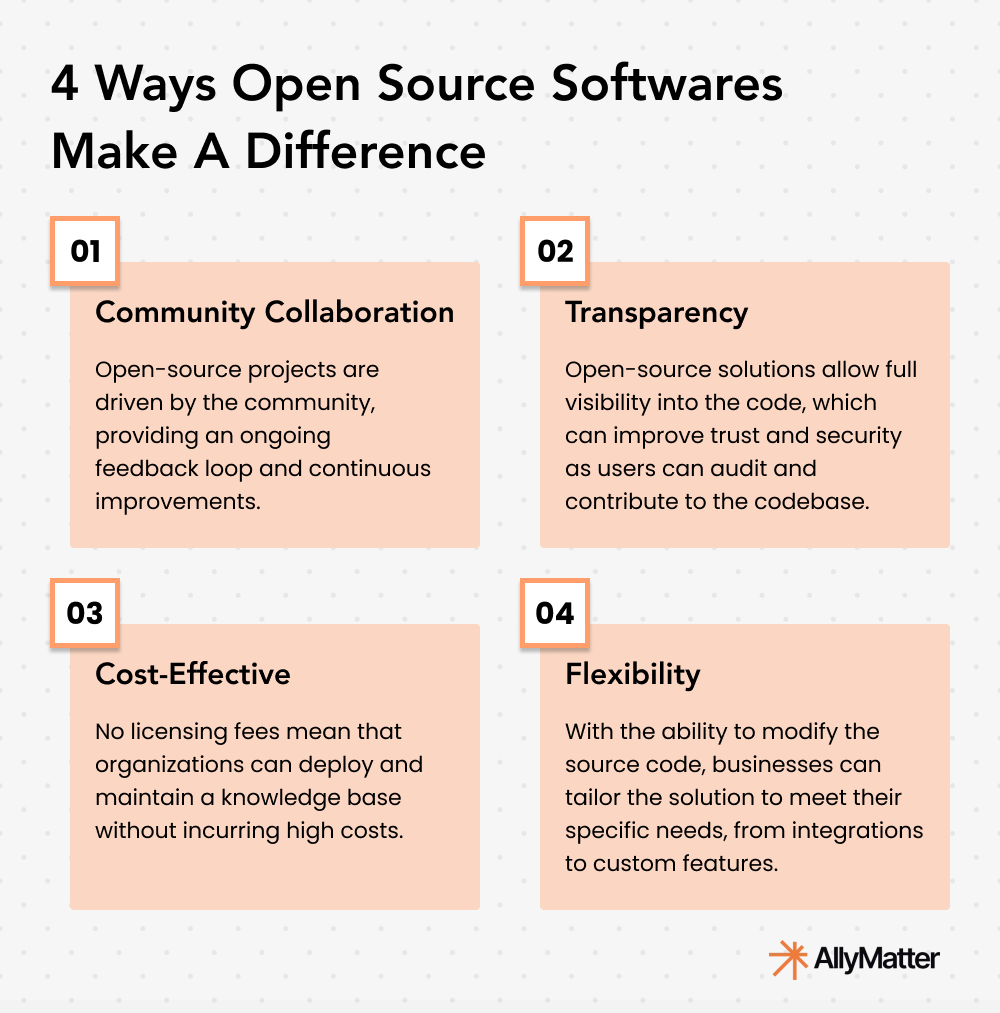
Choosing the right approach for your organization
When evaluating open source knowledge base solutions, consider this decision framework:
- If your priority is maximum customization flexibility with minimal restrictions, MIT-licensed platforms offer the best path forward.
- If ensuring that improvements and modifications remain available to the community matters to your organization, GPL-licensed solutions align with collaborative values.
- For teams building web-based services where users access the platform remotely, AGPL-licensed options provide transparency while maintaining open source principles.
Global list of top open source knowledge bases
BookStack
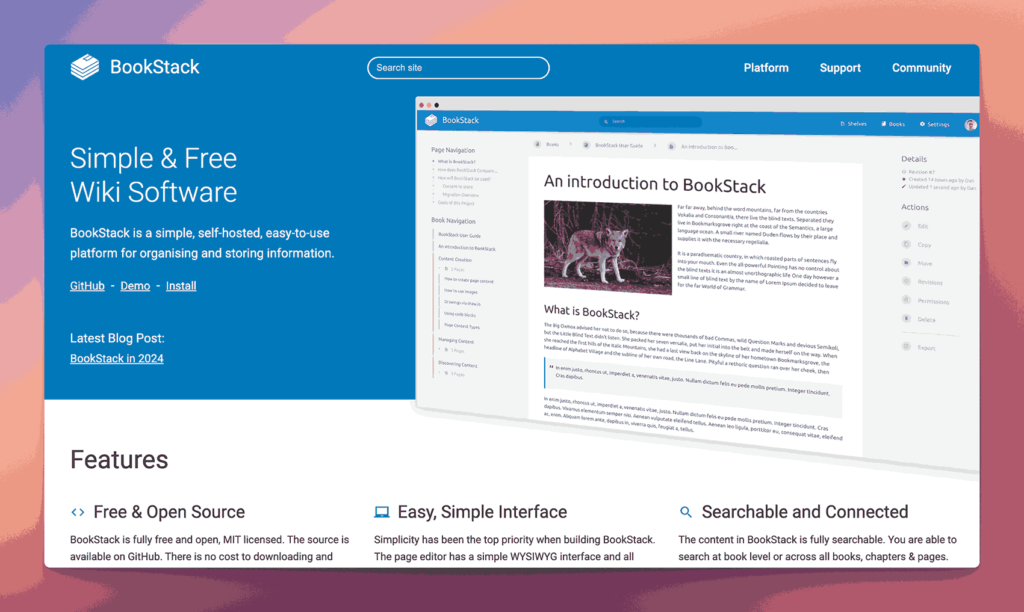
BookStack is a simple knowledge management platform designed specifically for creating and organizing documents in a book-like hierarchy.
Key information
- License: MIT
- Designed to be a standalone KB tool
Why you might like it
- Fully searchable with content segregated as ‘Books’, ‘Chapters’ and ‘Pages’
- Active community support for multilingual users
- Built for performance; can be run on low-scale private servers
Potential considerations
- Lacks integrated support for multimedia
- Limited visual customization options
- Complex UI for certain layouts
DocMost

DocMost is a wiki and document management software designed specifically for real-time collaboration.
Key information
- License: GNU Affero General Public License v3.0 (AGPLv3)
- Designed to be a standalone KB tool
Why you might like it
- Clean, intuitive interface with secure access management
- Reorder and manage pages with simple drag-and-drop
- No vendor lock-in; import or export pages in Markdown/HTML
Potential considerations
- Lacks advanced features like detailed analytics or integration with other enterprise tools
Outline
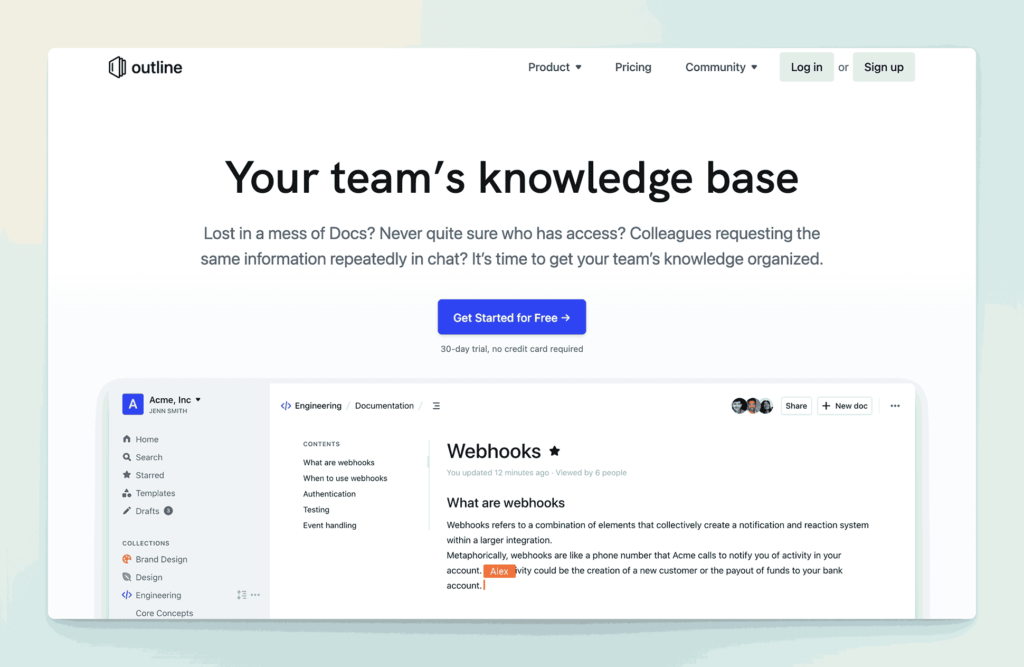
Outline offers a clean interface with robust search capabilities, built-in integrations (Slack, Zapier, etc.), ease of multiplayer collaboration and hierarchical content organization.
Key information
- License: Business Source License 1.1
- Designed to be a standalone KB tool
Why you might like it
- Fast, markdown-compatible solution with 20+ integrations and open APIs
- Clean, user-friendly interface that requires minimal onboarding
- Powerful AI search
Potential considerations
- Limited advanced features compared to more comprehensive project management or collaboration platforms
- Community-driven support model, which may affect response times for troubleshooting.
Typemill

Typemill is known for its versatile customization options offering individual themes, flexible plugins and stunning eBook layouts using Markdown.
Key information
- License: MIT
- Can be a standalone KB tool, but needs to be self-hosted
Why you might like it
- Flat-file interface with minimal installation and onboarding requirements
- Minimalist editor for Markdown content
- Customizable theme directory to pick and choose from
- Version management through Git or manual file backups
Potential considerations
- Setup requires hosting and some technical skill
- Less suited for enterprise or multi-team collaboration
Documize
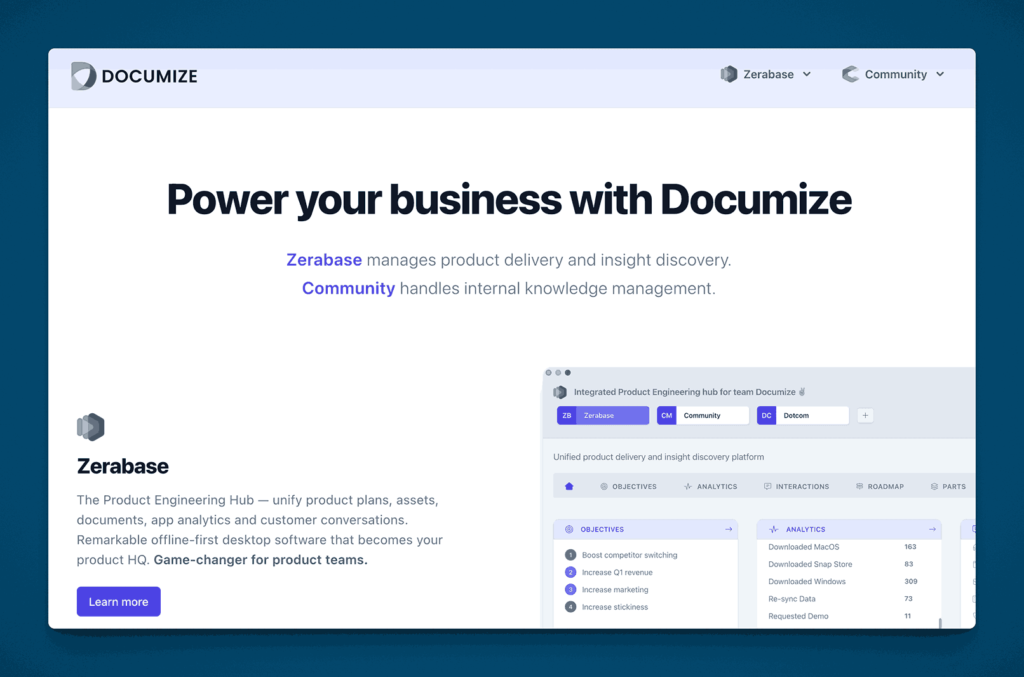
Documize blends wiki-style pages with structured data, and allows both technical and non-technical users to collaborate and store content efficiently.
Key information
- Offers both open-source (Community) and paid Enterprise editions.
- Can be a standalone KB tool, but needs to be self-hosted
Why you might like it
- Powerful search that indexes all content, including attachments
- Role-based permissions to control who can view, edit, or share docs
- Integration with tools like Slack and GitHub for streamlined workflows
Potential considerations
- Setup can vary based on self-hosted vs. cloud versions
- Learning curve for advanced features like templating and structured fields
Docusaurus
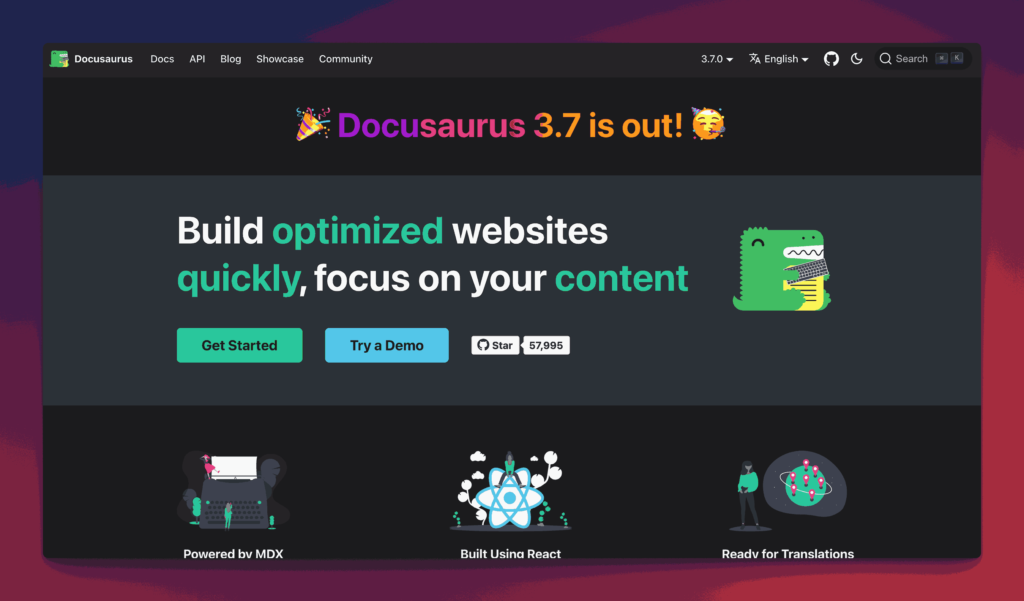
Docusaurs is a documentation site generator designed for real-time collaboration, version control, and seamless integration with tools like React.
Key information
- License: MIT
- Can be a standalone KB tool, but needs to be self-hosted
Why you might like it
- Versioning system that aligns with software releases
- React-based theming for customizable UI
- Large community and strong documentation
Potential considerations
- No built-in collaboration tools
- Might not be user-friendly for non-technical teams
MkDocs
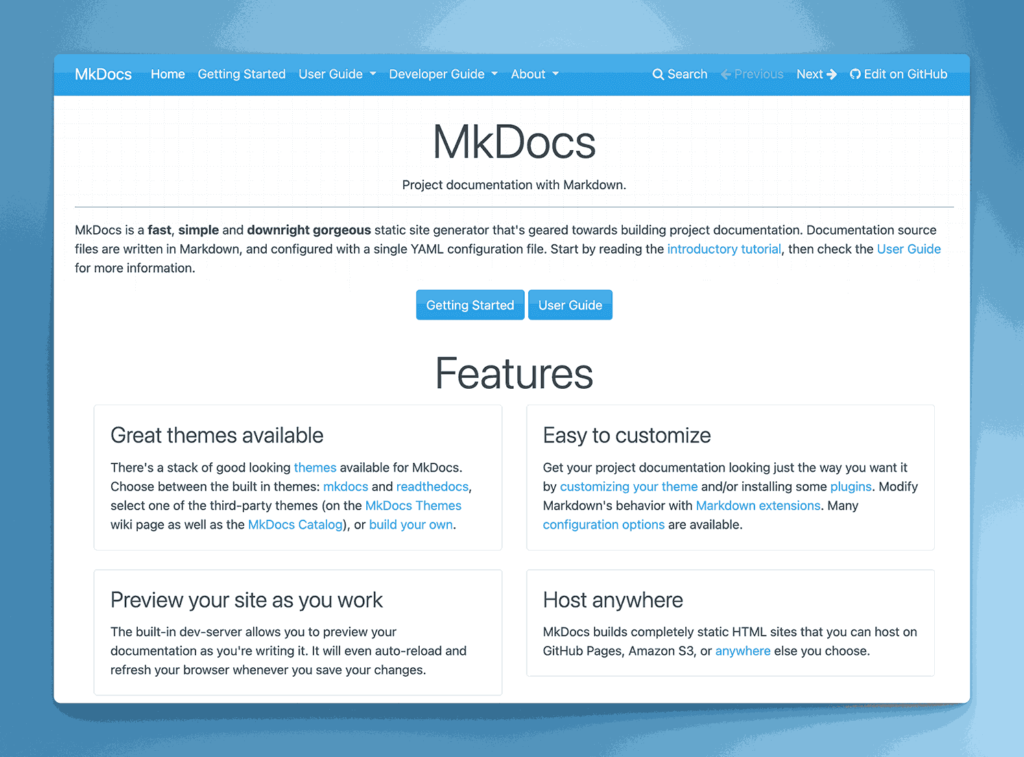
MkDocs is a static site generator written in Python. It is built to create project documentation from Markdown and features a wide range of customizable themes.
Key information
- License: MIT
- Can serve as a static, standalone KB
Why you might like it
- Markdown-based for quick, straightforward doc writing
- Git integration to track doc changes over time
Potential considerations
- No built-in database or dynamic editing features
- Requires technical setup (Python, CLI) to build and deploy
OpenKM
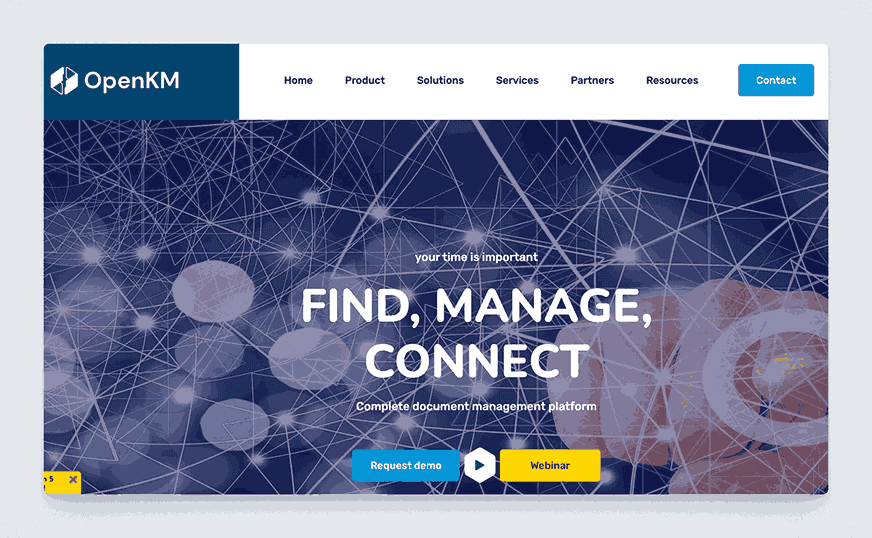
OpenKM provides version control, workflow automation, and metadata tagging, making it well-suited for organizations with large volumes of documentation.
Key information
- License: GNU General Public Licence version 2
Why you might like it
- Document-centric approach with comprehensive version management
- Workflow engine for document approvals and reviews
- Full-text search across multiple file types
Potential considerations
- Requires technical setup and maintenance for self-hosting
- Interface is less streamlined
GitBook
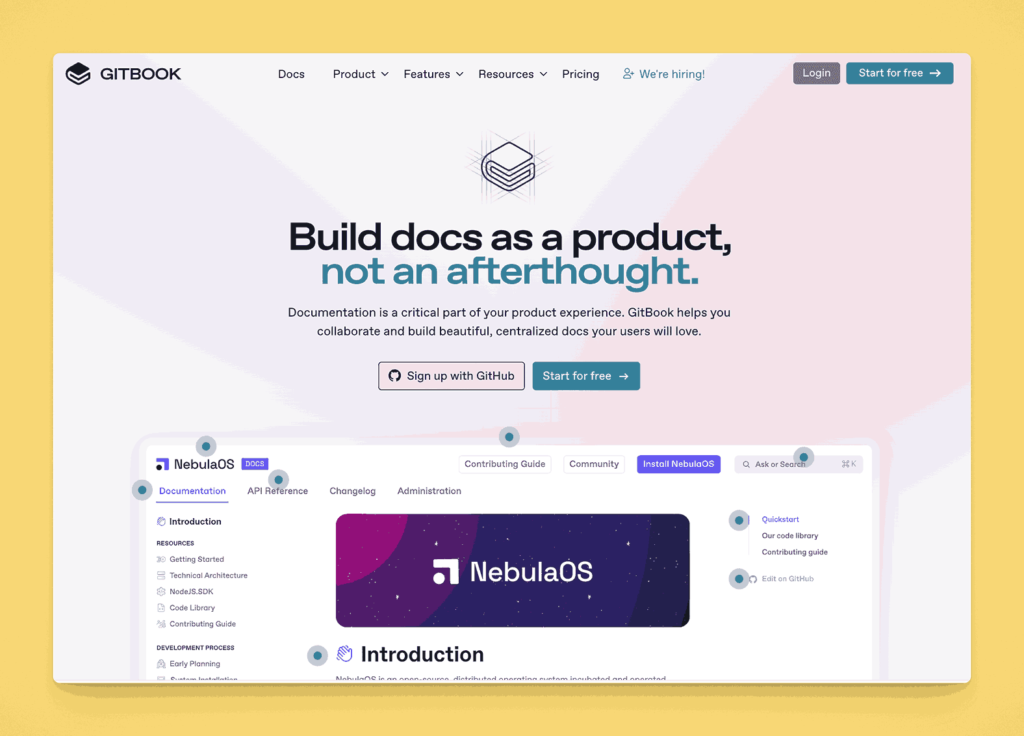
GitBook is a modern documentation platform that offers both cloud-hosted and self-hosted solutions for creating knowledge bases and documentation sites. Originally open-source, GitBook has transitioned to a freemium model, but it still offers a free open-source edition.
Key information:
- License: MIT
- Can serve as a standalone KB
Why you might like it:
- Clean interface with strong markdown support
- Seamless integration with GitHub for documentation.
Potential considerations:
- Some advanced features are locked behind the freemium model
- Customization options for the free version are limited compared to paid editions
Wiki.js
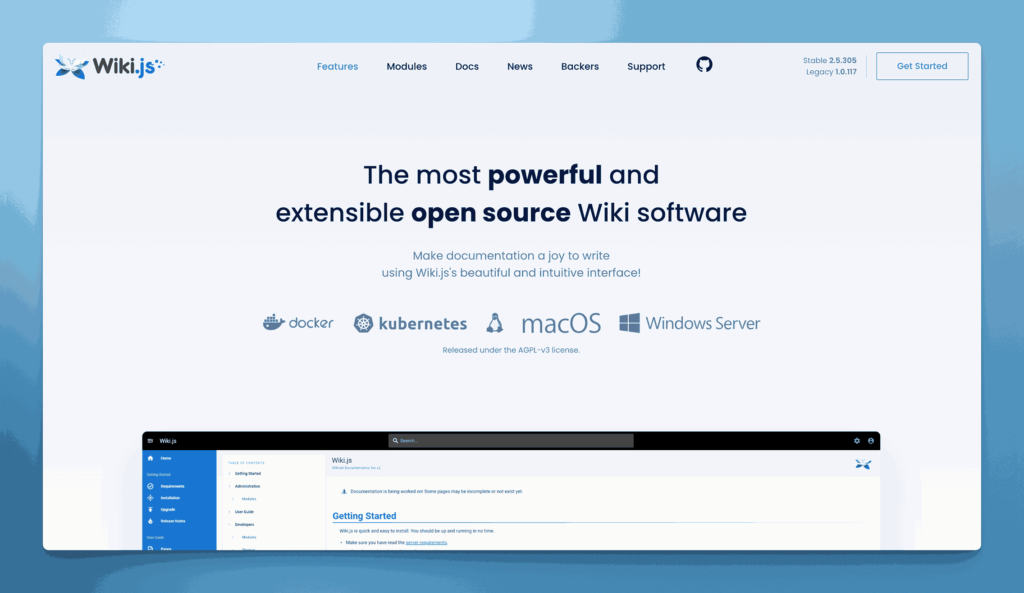
Wiki.js is a modern wiki software built with Node.js, providing an elegant and flexible knowledge management platform. It features a powerful editor, authentication via OAuth, LDAP support, and markdown rendering.
Key information
- License: GNU Affero General Public License v3.0
- It can operate as a standalone KB.
Why you might like it:
- Sleek interface and flexibility,
- Highly customizable and developer-friendly wiki platform
Potential considerations:
- Requires Node.js knowledge for installation and maintenance
- Advanced customization options can be overwhelming for non-technical users
DoKuWiki
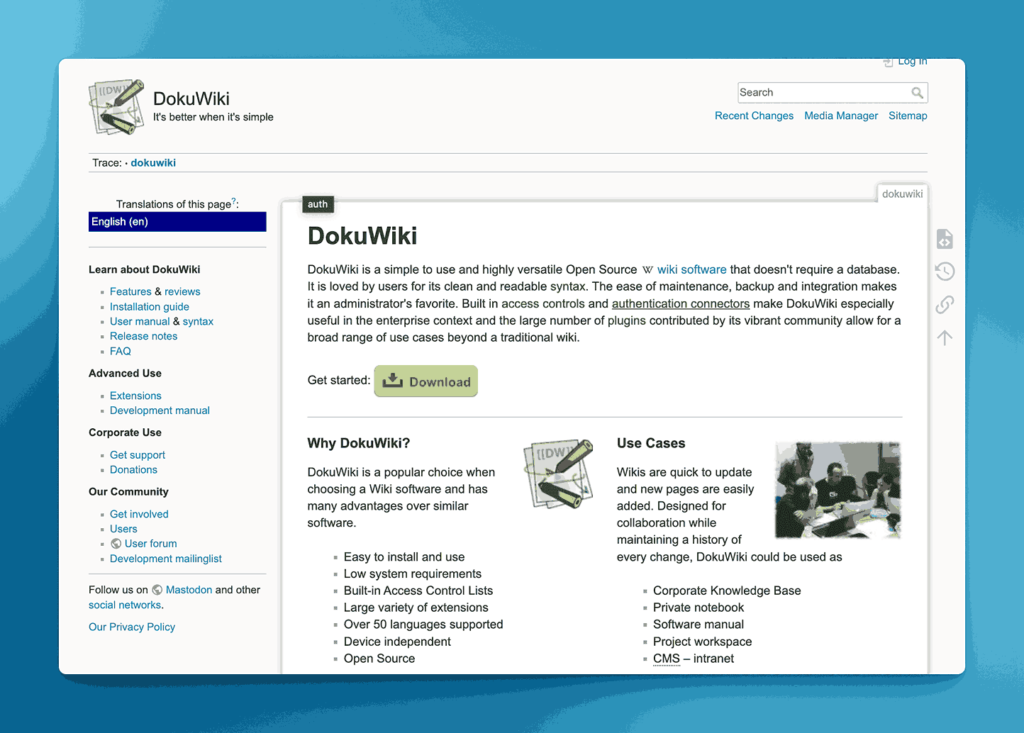
DokuWiki does not require a database, and offers clean and readable syntax. It supports extensive customization through plugins and templates, and is ideal for creating corporate knowledge bases, project workspaces, and personal wikis.
Key information:
- License: GNU General Public License Version 2
- Designed to be a standalone KB tool
Why you might like it
- Easy to install and maintain with minimal technical overhead
- Strong plugin ecosystem to extend functionality
- ACL (Access Control Lists) for granular user permissions
Potential considerations
- Limited built-in collaboration features
- Basic UI design compared to commercial solutions
MediaWiki
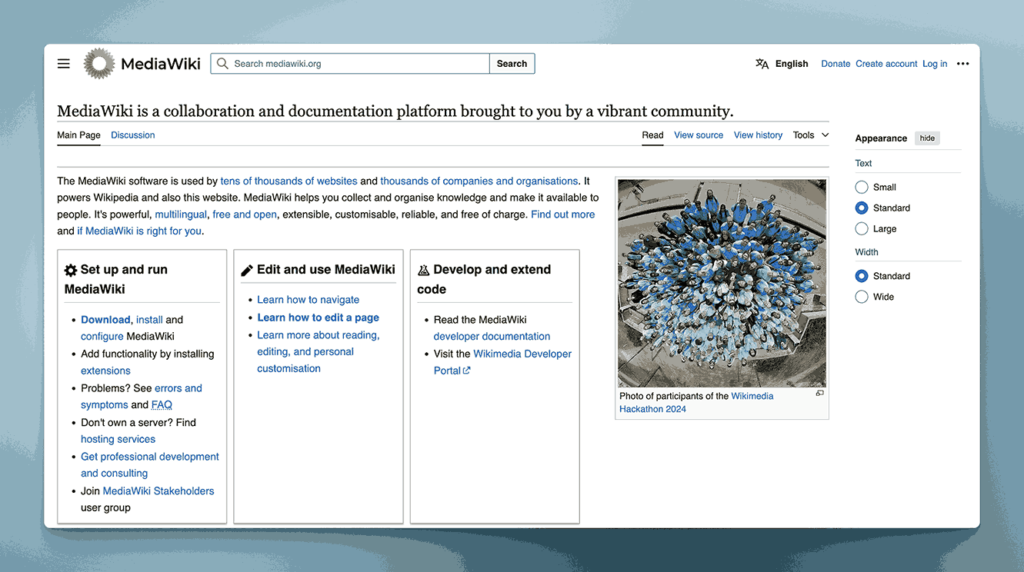
MediaWiki, the software behind Wikipedia, is a widely-used open-source platform for managing collaborative wikis.
Key information:
- License: GNU General Public License (GPL)
- Can serve as a standalone wiki
Why you might like it
- Designed to handle massive amounts of content
- Active community support for customizing functionality
- Built-in version history and robust revision control
Potential considerations
- Requires plugins for features like WYSIWYG editing, advanced permissions, or SSO
- Configuration can be time-consuming, especially for non-technical users
xWiki
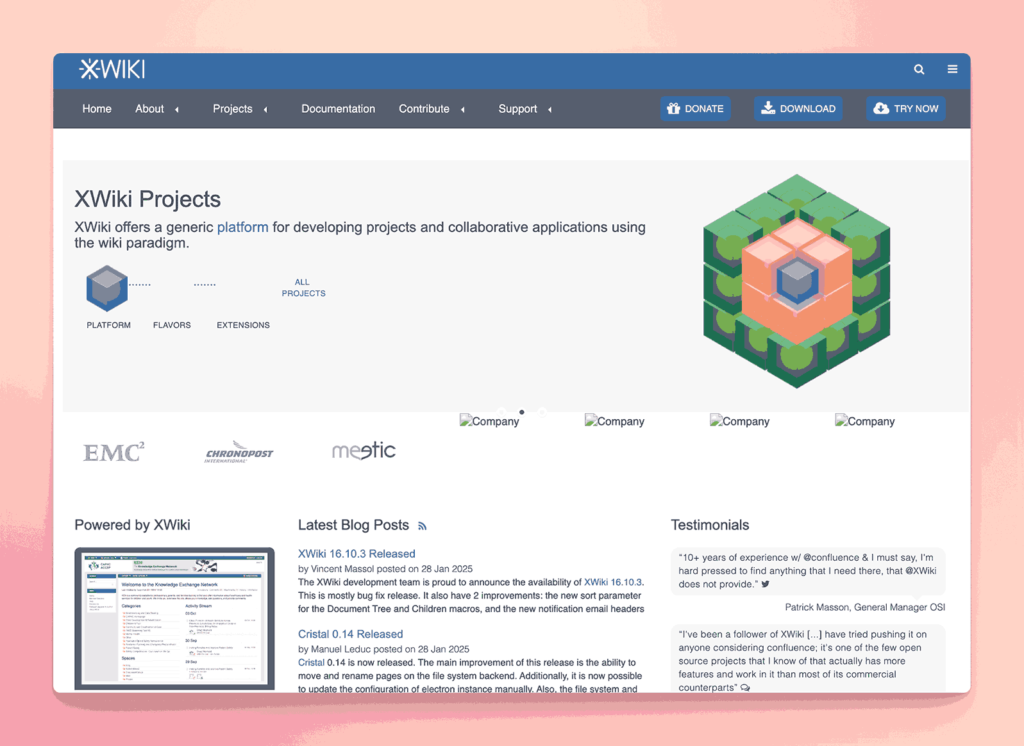
XWiki is designed for building custom documentation and web applications. It features powerful version control, access control and a modular extension system.
Key information
- License: GNU General Public License
- Can serve as a standalone KB.
Why you might like it
- Robust access permission system
- Version history built into each page
- Active open-source community for support and frequent updates
Potential considerations
- Hosting and setup might be too technical for non-IT teams
- Customization may demand time and technical understanding
TWiki
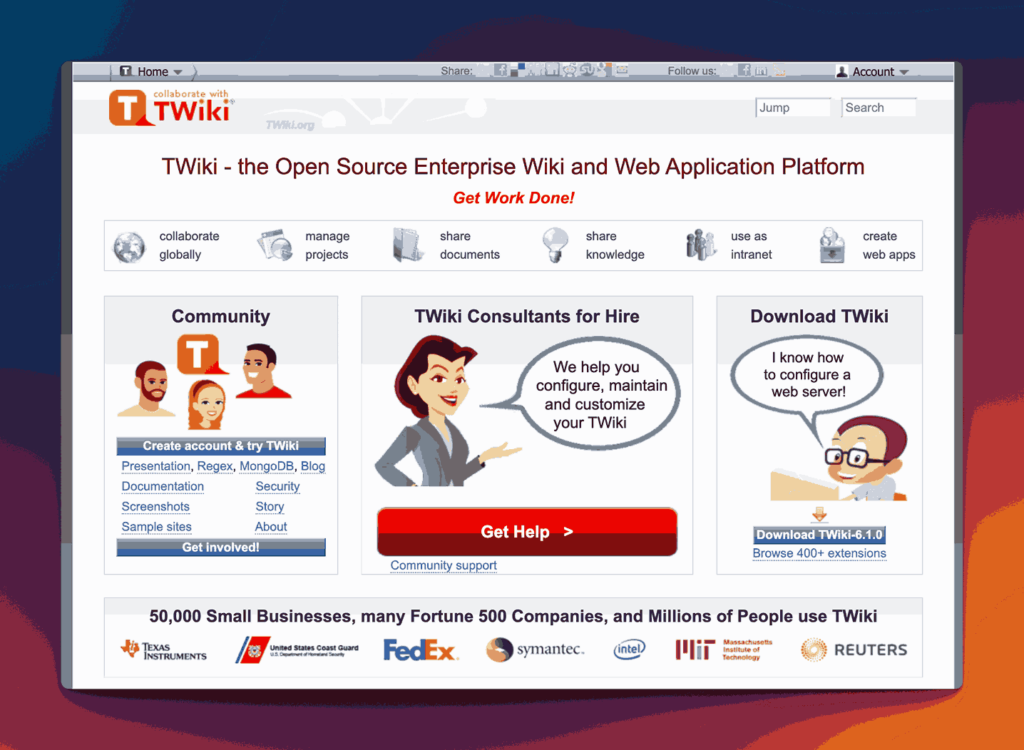
TWiki is a structured wiki application written in Perl, designed for enterprise collaboration. It has strong plugin support, user access controls, and a flexible framework for building custom wiki applications.
Key information
- License: GNU GPLv3 License.
- Can serve as a standalone KB, but needs to be self-hosted
Why you might like it
- Structured data approach allows for form-based pages and custom fields
- Extensible plugin ecosystem to add features
Potential considerations
- Compared to PHP or Node, perl-based environment is less commonly used
- Setup can be complex, requiring command-line and server knowledge
Understanding open-source licenses: What they mean and why they matter
When choosing an open-source knowledge base software, its license defines how the software can be used, modified, and shared. The type of license selected has legal, technical, and community implications, which can significantly impact how an organization implements, customizes, and distributes the software. Mentioned below are some of the most common open-source licenses and their meanings.
GNU General Public License v3 (GPLv3)
The GNU General Public License v3 (GPLv3) is one of the most widely used open-source licenses, offering strong protections for both the software developer and the end-user. It allows users to freely use, modify, and distribute the software, but with specific stipulations to ensure that these freedoms are preserved in derivative works.
Key features:
- Any modified version of the software must also be open-source and distributed under the same license.
- The license ensures that proprietary software cannot “steal” the open-source code without releasing their modifications.
- Includes protections against patent claims and prevents tivoization (locking down hardware so that only specific software can run on it).
Significance for users: If your organization wants to ensure that all modifications to the software remain open-source and available to the community, the GPLv3 license is an excellent choice. However, it does impose restrictions that may not be suitable for those who want more flexibility in how they use and distribute software.
MIT License
The MIT License is one of the most permissive open-source licenses, offering minimal restrictions. It allows anyone to use, modify, and distribute the software, including for proprietary use, as long as the original copyright notice is included.
Key features:
- Very permissive and allows for almost unrestricted use, modification, and distribution.
- Requires attribution, but it doesn’t require derivative works to be open-source.
- One of the simplest open-source licenses with few conditions.
Significance for users: The MIT License is an excellent choice if your organization wants maximum flexibility. You can freely modify the software and use it in both open-source and proprietary projects. However, it does not enforce the sharing of improvements or derivative works, which could reduce the collaborative nature of the software.
GNU Affero General Public License v3.0 (AGPLv3)
The GNU Affero General Public License v3.0 (AGPLv3) is similar to the GPLv3 but has an added requirement: if the software is used over a network (e.g., as part of a web service), the source code must be made available to users who interact with it.
Key features:
- Like the GPLv3, any modified versions must also be open-source.
- Requires that if the software is used to provide a service over a network, users must be able to access the source code of the version being used.
- Aimed at ensuring that users who interact with software over a network (e.g., SaaS apps) have access to the source code.
Significance for users: If you are building a service that will be accessed over the internet (such as a web-based knowledge base or internal wiki), the AGPLv3 ensures that any modifications made to the software are also shared with users, promoting transparency. However, organizations that don’t want to make their modifications public may find this license too restrictive.
Business Source License 1.1
The Business Source License 1.1 (BSL 1.1) is a unique open-source license that allows companies to use and modify the software freely but with a time-limited restriction on its commercial use. After a set period (usually 3 years), the software becomes open-source under a more permissive license, such as the MIT License or GPL.
Key features:
- Free for open-source development, personal use, and non-commercial projects.
- Commercial use is restricted during a specified “source-available” period, after which the software becomes fully open-source.
- Designed to balance open-source collaboration with the ability to monetize software for the initial period.
Significance for users: The BSL 1.1 is typically chosen by companies that want to encourage contributions from the community while still maintaining commercial control for a period of time. For organizations considering long-term open-source involvement, the BSL 1.1 can be a stepping stone before transitioning to a fully permissive license.
GNU General Public License Version 2 (GPLv2)
The GNU General Public License Version 2 (GPLv2) is the predecessor to GPLv3, and while it shares many similarities, it has some key differences. It is a copyleft license, meaning that any derivative works must be open-source and distributed under the same terms.
Key features:
- Requires that any modified versions or derivative works be open-source and licensed under GPLv2.
- Does not include some of the provisions found in GPLv3, such as protections against tivoization and patent claims.
- Does not require users who access the software over a network to share their changes (unlike the AGPLv3).
Significance for users: If your organization is focused on open-source collaboration and you want to ensure that modifications remain open-source, GPLv2 is a strong choice. However, its lack of network use provisions and less stringent patent protections compared to GPLv3 could be seen as limitations for some modern applications.
GNU General Public License (GPL)
The GNU General Public License (GPL) is a family of open-source licenses designed to protect the freedom of users to run, modify, and share software. GPLv2 and GPLv3 are the most commonly used versions, but all versions share similar principles.
Key features:
- The core principle of GPL is that modified versions of the software must also be distributed under the GPL, ensuring that the software remains open-source.
- GPL has provisions to protect against proprietary versions and encourage the sharing of improvements.
Significance for users: The GPL family is designed to protect the collaborative spirit of open-source software. If your organization values keeping improvements open-source and ensuring users’ freedom to use and modify software, the GPL is a great choice. However, it imposes more restrictions than permissive licenses like MIT.
Next steps
Assess your organizational needs
Before selecting a knowledge base platform, it’s crucial to assess your organization’s specific requirements. Consider factors such as the size of your team, the complexity of your documentation needs, and the level of customization you might require. Make sure to factor in your future growth and how your needs may evolve over time.
Consider Maria, an operations manager at a growing consulting firm with 75 employees across three departments. She initially chose Wiki.js for its clean interface and extensive customization options. However, three months into implementation, her team struggled with Node.js maintenance requirements and version updates. This experience highlighted the critical importance of matching platform complexity with available technical resources before making a final selection.
Evaluate features and usability
Each open-source tool offers different strengths. For smaller teams or those with simpler documentation needs, a platform like DokuWiki or Wiki.js may be ideal. For larger organizations that require advanced collaboration and integration, tools like Documize may be more appropriate. Focus on what will best serve your core objectives without unnecessary complexity.
Plan for growth
While many of these open-source solutions are scalable, be sure to choose one that can handle your organization’s growth over time. Look for platforms that offer flexibility in terms of features, integrations, and pricing models, ensuring that they will continue to meet your needs as you expand.
Implement strong governance and maintenance
No matter which platform you select, it’s essential to establish clear guidelines for content creation, updates, and maintenance. A well-managed knowledge base is a dynamic resource that needs regular attention to remain relevant and effective. Make sure to involve key stakeholders in governance decisions to ensure long-term success.
Ready to explore knowledge management without the technical complexity? Join AllyMatter’s waitlist.
Frequently asked questions about open source knowledge bases
What’s the difference between open source and proprietary knowledge base software?
Open source knowledge bases provide access to source code, allowing unlimited customization and no licensing fees. Proprietary solutions offer dedicated support and ready-made features but come with subscription costs and limited modification options.
How much technical expertise do I need to implement an open source knowledge base?
Most open source knowledge bases require basic server administration skills for installation and maintenance. Solutions like DokuWiki and BookStack are beginner-friendly, while platforms like MediaWiki and xWiki need more technical knowledge for optimal setup.
Can open source knowledge bases handle enterprise-level security requirements?
Yes, many open source solutions offer robust security features including role-based access control, encryption, and audit trails. However, implementing enterprise security often requires technical configuration and regular updates to maintain security standards.
What are the hidden costs of open source knowledge base software?
While the software is free, consider hosting costs, development time for customization, ongoing maintenance, and potential need for technical support. These operational costs can vary significantly based on your implementation approach and internal technical capabilities.


